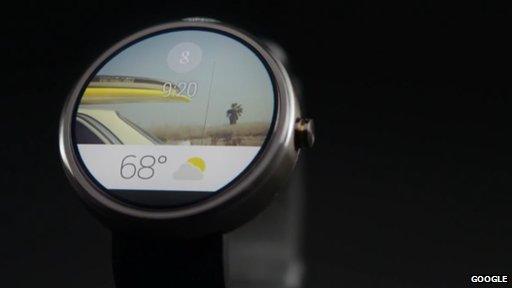Google unveils Android for wearables
- Published

Google produced mock-ups of what Android-based wearables might look like
Google has announced a version of its Android operating system designed specifically for wearable devices.
The first release of Android Wear is designed for smartwatches and helps them follow voice commands.
Google said it was also working with electronics firms, chip makers and fashion labels on wearable gadgets running Android.
One of the first Android Wear devices will be Motorola's Moto 360 smart watch that will go on sale in the summer.
The search giant's work on Android Wear builds on its experiences with Google Glass augmented spectacles.
Android Wear was announced via the official Google blog and marks a significant move for the company into the wearables sector.
In a blogpost Sundar Pichai, external, head of Android at Google, said the software would prove useful for gadgets that monitor key health parameters or which people use when they go running or cycling.
It could also lead to a class of devices that respond quickly to spoken commands including answering short questions, booking a taxi or sending a text without having to tap anything on a smartphone touchscreen.
Google said it was working on a new user interface for Android that reacted quickly, was driven by a person's voice and which drew on contextual information, such as a user's location, to be useful.
Software development kits which application developers can play with have also been released.
"We're always seeking new ways for technology to help people live their lives and this is just another step in that journey," wrote Mr Pichai.
The decision to move into wearables would pitch Google into more intense competition with arch-rival Apple, said Stuart Miles, founder of tech news site Pocket-lint.
"It's a threat to Apple because the Android ecosystem is growing so fast," he said.
Some of the early designs for Android Wear smart watches looked great, he added, and if that were combined with a good second-screen notification system it could win people over and get them to defect from Apple,
However, he said, his experiences of living with a Pebble smart watch for the last four months showed that people had yet to adapt to the appearance of such devices.
"The social element that is against it is that people think you are bored of them when you are looking at your smart watch," he said.
- Published13 March 2014
- Published14 February 2014
- Published10 December 2013
- Published2 December 2013